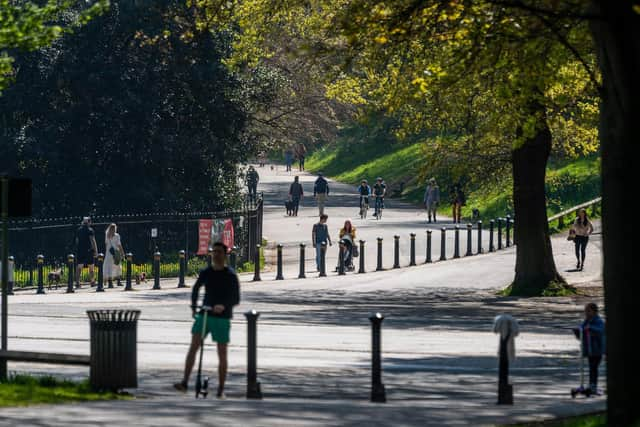Young men more likely than women to break lockdown rules, according to survey
A team of psychologists, led by Dr Liat Levita, from the University of Sheffield, surveyed 2,000 13 to 24-year-olds in the UK to examine the impact of the pandemic on young people.
The study found that over 50 percent of young men aged between 19-24 years old had breached lockdown rules to meet friends, compared with a quarter of women of the same age.
Advertisement
Hide AdAdvertisement
Hide AdJoin our new coronavirus Facebook group for the latest confirmed news and advice as soon as we get it.


According to the research a fifth of men aged 19-21 are thought to have been dispersed, arrested, fined or taken home by police for breaking the rules, compared with one in 10 women in this age group.
Dr Levita said: “It is really striking how much older male adolescents stand out in terms of violating physical distancing rules.
"This is consistent with what we know about their greater tendency to take risks, and reflects their belief that following the guidelines isn’t worthwhile."
Advertisement
Hide AdAdvertisement
Hide AdMen aged between 19-24 years-old were likely to have a positive perception of people their age breaking the rules, according to the research.
It was suggested they could regard these people as “cool” and “independent”, while other groups saw them as “self-centred” and “immature”.
Researchers also found that up to half of young people now feel significantly more anxious than before the lockdown. The youngest teenagers showed the highest rates of anxiety, while older groups showed lower levels of overall wellbeing.
Those who were more anxious were more likely to comply with physical distancing measures, whereas those with higher levels of depression were more likely to break the rules.
Advertisement
Hide AdAdvertisement
Hide AdLevels of anxiety and depression were up to 10% higher among black and mixed race participants in the survey than white and Asian respondents.
The research team has called on the Government to do more to explain the reasons for ongoing physical distancing to persuade young men in particular to follow the rules as the lockdown begins to be eased.
Dr Levita said: “Explaining the reasons behind ongoing physical distancing measures will be crucial to persuading young men to follow the rules as the government begins to ease the lockdown.”
She added: “We should also be careful in painting an overly bleak picture. Not everyone will experience this period negatively, and we found that some of our teens are enjoying being at home with their parents more than ever, and are not more anxious or worried than before."
Advertisement
Hide AdAdvertisement
Hide AdSimilar surveys will also be carried out at the University of Ulster, with additional collaborators from University College London, Liverpool and Royal Holloway and Bedford College.
The team said they will survey the same group again in the coming months.
Dr Levita said: “Our young people are growing up in a time of pandemic, and our study is helping us understand the implications of this on their current and future wellbeing.
“We are now investigating the factors that support young people’s resilience in the short and long term, to shape future government policy targeted specifically at helping them through this period of unprecedented uncertainty.”
Advertisement
Hide AdAdvertisement
Hide AdThe study was launched after a number of charities warned of a mental health crisis during the Covid-19 shutdown.
Dr Jilly Gibson-Miller, Lecturer in Health Psychology at the University of Sheffield, said: “This is one of the first studies of the 'psychology of epidemics' during perhaps one of the biggest existential threats the world has faced this century."
___________________________________
Editor’s note: first and foremost - and rarely have I written down these words with more sincerity - I hope this finds you well.
Almost certainly you are here because you value the quality and the integrity of the journalism produced by The Yorkshire Post’s journalists - almost all of which live alongside you in Yorkshire, spending the wages they earn with Yorkshire businesses - who last year took this title to the industry watchdog’s Most Trusted Newspaper in Britain accolade.
Advertisement
Hide AdAdvertisement
Hide AdAnd that is why I must make an urgent request of you: as advertising revenue declines, your support becomes evermore crucial to the maintenance of the journalistic standards expected of The Yorkshire Post. If you can, safely, please buy a paper or take up a subscription. We want to continue to make you proud of Yorkshire’s National Newspaper but we are going to need your help.
Postal subscription copies can be ordered by calling 0330 4030066 or by emailing [email protected]. Vouchers, to be exchanged at retail sales outlets - our newsagents need you, too - can be subscribed to by contacting subscriptions on 0330 1235950 or by visiting www.localsubsplus.co.uk where you should select The Yorkshire Post from the list of titles available.
If you want to help right now, download our tablet app from the App / Play Stores. Every contribution you make helps to provide this county with the best regional journalism in the country.
Sincerely. Thank you.
James Mitchinson
Comment Guidelines
National World encourages reader discussion on our stories. User feedback, insights and back-and-forth exchanges add a rich layer of context to reporting. Please review our Community Guidelines before commenting.